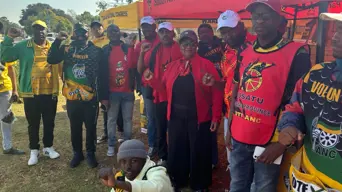LUCKY BOPAPE: Response to Yonela Diko | Dismissing key players in ANC’s power ascent disingenuous to SACP, civil society
In his opinion piece, Diko fails to acknowledge that the ANC as a mass movement encompasses not only communists, but also workers and civil society, writes Lucky Matome Bopape.

SACP and ANC volunteers in Gauteng to assist at the World Praise Christian Centre International voting station on 29 May 2024. Picture: Facebook/SACP1921
The outcome of the 2024 general elections is a pivotal moment for the African National Congress (ANC)-led alliance as it seeks to regain voter support and reestablish its dominance among South Africa's working class.
However, the increasing influence of liberal forces within the ANC undermines its progressive aspects and reveals an intolerance towards criticism.
This dynamic highlights the entrenched nature of the ruling ANC liberal elite and their apparent willingness to witness the dissolution of the ANC-led alliance in favour of a liberal alternative disguised as the Government of National Unity (GNU).
In response to an interview with Solly Mapaila, General Secretary of the South African Communist Party (SACP), Yonela Diko's article titled "For the ANC to survive, it must let go of the SACP" overlooks fundamental aspects of the national liberation movement.
Diko fails to acknowledge that the ANC as a mass movement encompasses not only communists but also workers and civil society.
These groups have long played a critical role in the alliance, and the triumph over apartheid was not solely attributed to the ANC, but rather to a broader, multi-class movement of alliances, including communists who have steadfastly upheld their class-oriented ideology within the ANC.
Efforts to suppress the SACP's critical perspectives on the GNU decision demonstrate a lack of understanding within the ANC regarding its own nature as a multi-class movement.
There is little recognition of the diverse forces that have kept the ANC in power.
Diko's proposal that the ANC should distance itself from the SACP and fracture the alliance, instead of fostering unity, represents a betrayal of the National Democratic Revolution (NDR). This line of thinking seeks to marginalise communists within the ANC in favour of a neoliberal agenda, which could ultimately sever the connection between the ANC and the masses it claims to represent.
In a manner reminiscent of the Mbeki administration's anti-communist stance, Diko implies that voices critical of ANC leadership – specifically those of communists, trade unions, and civil society – should be suppressed.
He advocates for a system in which these alliance partners are expected to obediently follow orders, thereby establishing a hierarchical relationship where the ANC assumes a dominant role.
Defending the Mbeki administration's 1996 neoliberal agenda, exemplified by the Growth, Employment, and Redistribution (GEAR) Policy, overlooks its failures in effectively addressing the persistent issues of unemployment, poverty, and inequality in the country.
The ANC's estrangement from its mass support base began with the implementation of GEAR, which prioritised liberal ideals of privatisation and market-led solutions, instead of State-driven redistribution and community development.
Diko further reflects upon a pivotal moment in 1994, during the Mbeki administration, when the ANC adopted a neo-liberal approach with little tolerance for internal criticism.
This period marked the commencement of marginalisation for alliance partners such as the SACP, workers, and civil society – key actors who played a vital role in facilitating the ANC's ascent to power.
Diko's arguments dismiss the significant contributions made by these groups during the struggle for liberation, implying that their significance has waned in the post-apartheid era.
He fails to recognise that the defeat of apartheid and the ANC's rise to power was not solely accomplished by the ANC itself, but rather through a united front comprised of communists, the trade union move, the masses, and civil society. These forces not only combated the socio-economic disparities perpetuated by apartheid but also generated a multitude of freedom fighters.
The period following 1994 necessitated that the ANC address the entrenched economic monopolies inherited from the colonial and apartheid systems.
This imperative for economic transformation was articulated through the NDR, which sought to dismantle "white monopoly capital" and embark on a process of redistribution in accordance with the principles espoused in the Freedom Charter.
However, the adoption of neo-liberal policies like GEAR deviated from this trajectory and contributed to an increasing disconnect between the ANC and the working class, as well as the wider masses.
In conclusion, it is misleading for Diko to place blame solely on the SACP for any internal divisions within the ANC-headed alliance.
He fails to recognise the broader leadership crisis and ideological shifts within the ANC that have weakened its electoral position. The ANC's internal organisational decay and erosion of democratic processes have led to an exodus of members, including the formation of splinter groups in our country.
It is disingenuous to suggest that when the SACP raises concerns about the alliance's direction, it should be treated as an enemy rather than as a partner.
The SACP's critique of neo-liberal policies is rooted in its class character and aims to address contradictions in ANC policy, not to target individuals within the movement.
Ultimately, the masses, not individual elites, will determine the outcome of the struggle.
It is through their collective action that the ANC can realign with its founding principles, and reclaim its position as a true representative of the people.
Lucky Matome Bopape is a member of the SACP’s Provincial Executive Committee, and Deputy Provincial Secretary of National, Education, Health and Allied Workers Union (NEHAWU) in the Western Cape.